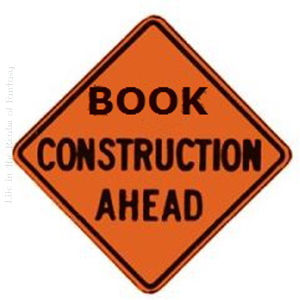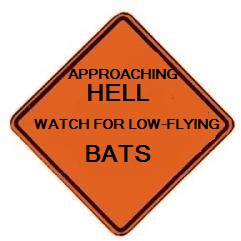 As it is March and is that month known as National Novel Editing Month, or NaNoEdMo, I will be be revisiting some of my posts on the craft of writing. Today we are looking at that most abused morsel of punctuation, the Hyphen. In my own work I will be looking at each hyphen and deciding if it stays or if it goes. Much of the time, they must go.
As it is March and is that month known as National Novel Editing Month, or NaNoEdMo, I will be be revisiting some of my posts on the craft of writing. Today we are looking at that most abused morsel of punctuation, the Hyphen. In my own work I will be looking at each hyphen and deciding if it stays or if it goes. Much of the time, they must go.
Most authors know that a compound word is a combination of two or more words that function as a single unit of meaning. Most of us even know that there are two types of compounds: those written as single words, with no hyphenation and which are called “closed compounds”– such as the word “bedspread,” AND the “hyphenated compounds,” such as “jack-in-the-box” and “self-worth.”
But there is a third group, and they are the bane of my life–those mysterious, ephemeral denizens of the deepest corner of writer’s hell, called open compounds. These seemingly innocent instruments of torture are written as separate words–the nouns “school bus” and “decision making,” for example.
But how do I tell if it’s one word, two words or a hyphenated word?
Do not use a hyphen unless it serves a purpose. If a compound adjective cannot be misread or, as with many psychological terms, its meaning is established, a hyphen is not necessary. For example:
- covert learning techniques,
- health care reform,
- day treatment program,
- sex role differences,
- grade point average
Do use one in a temporary compound that is used as an adjective before a noun, use a hyphen if the term can be misread or if the term expresses a single thought:
For example:
“the children resided in two parent homes” means that two homes served as residences, whereas if the children resided in “two-parent homes,” they each would live in a household headed by two parents. In that case, a properly placed hyphen helps the reader understand the intended meaning.
We also use hyphens for compound words that fall into these catagories:
- the base word is capitalized: pro-African
- numbers: post-1910, twenty-two
- an abbreviation: pre-ABNA manuscript
- more than one word: non-achievement-oriented students
- All “self-” compounds whether they are adjectives or nouns such as self-report, self-esteem, self-paced.
We hyphenate words that could be misunderstood if they’re unhyphenated:
- re-pair (to pair again) as opposed to repair (to mend)
- re-form (to form again) as opposed to reform (to improve)
We hyphenate words in which the prefix ends and the base word begins with the same vowel:
- meta–analysis, anti–intellectual
But really, unless you are a technical writer, how often are we going to use these terms? Hence, the confusion when we DO use them.
Get It Write online dot com says, “One way to decide if a hyphen is necessary is to see if the phrase might be ambiguous without it. For example, “large-print paper” might be unclear written as “large print paper” because the reader might combine “print” and “paper” as a single idea rather than combining “large” and “print.” Another such example is “English-language learners.” Without the hyphen, a reader might think we are talking about English people who are learning any language rather than people who are learners of the English language.”
Write most words formed with prefixes and suffixes as one word with NO hyphen.
- Prefixes: Afterglow, extracurricular, multiphase, socioeconomic
- Suffixes: Arachnophobia, wavelike, angiogram
 Hooray for Merriam-Webster! One can also look the word up in an online dictionary, to see the various different ways it can be combined. Just go to: http://www.merriam-webster.com
Hooray for Merriam-Webster! One can also look the word up in an online dictionary, to see the various different ways it can be combined. Just go to: http://www.merriam-webster.com
Now the real point of all this is that no matter how much I know when I am editing for another author, I always manage to screw up my own work amazingly well. It’s like my finger has a twitch that absolutely MUST add a hyphen. Thank god for good editors.
Credits:
Get It Write Online, Writing Tip Compound Words: When To Hyphenate © 2003, http://www.getitwriteonline.com/archive/042703compwdshyph.htm, accessed Feb 28, 2017








Reblogged this on Chris The Story Reading Ape's Blog.
LikeLiked by 1 person
Thank you, Chris 🙂
LikeLiked by 1 person
Welcome Connie 👍
LikeLike
Reblogged this on Wind Eggs and commented:
I don’t live in hyphen hell, more like a zone where hyphens nip the skin like mini-mosquitoes. Or is it mini mosquitoes. Grammerly and spellcheck get it wrong sometimes. Connie Jasperson shares her guidelines for hyphenation.
They’ll help a little, until you lose the link to the blog. But that’s just me being neg…proactive. I’m bookmarking this now.
I’ll forget where I bookmarked it, but you’ll do a better job. I’m sure.
PS: I’m not still paying my student loans at 62 to pay for college to learn this. I paid for college to expand my horizons and stretch my brain. But I did learn this at college.
LikeLiked by 1 person
Thank you Phillip 🙂 You made me smile.
LikeLike
Very very helpful. Thank you!
LikeLike
Thank you for stopping by!
LikeLike
Nice post on hyphens, but your title is way misleading. It makes it sound like hyphens are always bad things and should be avoided, yet when you read the article you’re saying they’re actually necessary at times. They just have to be used in the correct way. Maybe a new title to make it sound less like clickbait?
LikeLiked by 1 person
Well, this is a first! Since my site is not monetized, I can honestly say I don’t engage in propagating click bait, lol!
LikeLike
I never said it was clickbait or that you propagated it. I said the title sounds like it because it’s misleading. Hyphens aren’t the devil. They are a necessity in some words and phrases. Your post and your title don’t match.
LikeLiked by 1 person
Oh geez. Thank goodness for editors. You explained this in a fun, friend,y and clear way.
LikeLiked by 1 person
I’m glad you found it useful!
LikeLiked by 1 person
good post. Thank you.
LikeLiked by 1 person
Glad you found it useful!
LikeLike
Good post. Thank you.
LikeLike
Well done and very appropriate for me. I stumble over hyphens all of the time.
.
LikeLiked by 1 person
As do I – and sadly, I don’t think about these rules until I’m faced with cleaning up my own mess 😦
LikeLike
Thanks for the heads up. Must always check. Depending on my frame of mind, I make boo boos.
LikeLiked by 1 person
I am always a work in progress and these things always crop up in my manuscript ☆
LikeLike
Thanks, Connie, for this helpful information. 🙂 — Suzanne
LikeLiked by 1 person
Glad you stopped by!
LikeLike
Hi Connie,
Now I remember why I never received more than a B in English. I’m a novice writer and thank goodness there are Editors out there like you to keep all this straight. I’m an accountant and it was hard enough keeping up with all of our rules. Thanks for an excellent refresher, although, I have to admit my head is still spinning.
LikeLiked by 1 person
Thank you for the kind words, Chuck! 🙂
LikeLiked by 1 person
Very useful, thank you.
LikeLiked by 1 person
Thank you for stopping by!
LikeLiked by 1 person